
‘Always Something New’: Explore Book Recommendations from Trinity College Faculty
Vy Duong ’26 asked some Trinity professors to recommend interesting books to students and other members of the College community.
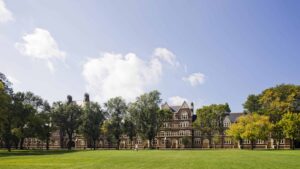
Trinity College has hired 11 new faculty members to tenure-line positions this year.
“These scholar-teachers bring a range of talent and perspectives to Trinity in their new roles,” said Sonia Cardenas, dean of the faculty and vice president for academic affairs. “We look forward to welcoming our extraordinary new faculty cohort.”
Cardenas added, “It was a highly competitive job market, and we are quite fortunate to have them joining us, thanks to the hard work of many members of our community.”
Trinity College President Daniel G. Lugo said that the scholarship of the new tenure-track faculty members represents an impressive range of disciplines. “They bring expertise spanning fields from Iberian literature and culture studies to electromagnetic engineering innovations,” he said. “Their breadth of knowledge will add dimension to how we deliver our Trinity Plus curriculum and shape bold, independent thinkers.”
The new tenure-track faculty members began their appointments on July 1, 2025. They are: Diego Baena, language and culture studies; Benjamin Bruce, mathematics; Anand Butler, economics; Samuel P. Catlin, religious studies; Dominick R. Cooper, philosophy; Ruoxing Gao, engineering; Philipp M. Gemmel, chemistry; Shoshana R. Goldstein, urban studies; Valeria Jiménez, economics; Rachel Keeffe, biology; and Michael Thompson-Brusstar, political science.
Read more about them below.
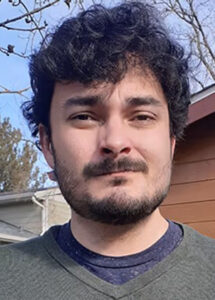
Baena first came to Trinity in 2022 as a visiting assistant professor of language and culture studies. His research areas include modern Iberian literature and cultural history (18th century-present), as well as popular cultures, popular literacy, and dissident political movements in 19th-century Spain.
“I look forward to new collaborations with our wonderful faculty at LACS and across campus, and in continuing to foster critical dialogue with my students on the complex cultural and historical processes that shape our present,” Baena said. In addition to courses in Spanish language, he teaches courses on Iberian culture, migrations to and from modern Spain, and popular media in modern Spain. Baena previously was a King Juan Carlos I of Spain Postdoctoral Fellow, at the King Juan Carlos I of Spain Center at New York University.
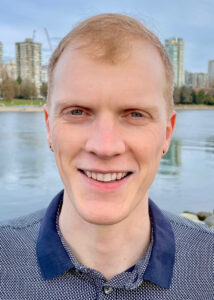
Bruce specializes in harmonic analysis, the study of waves and signals. “It somewhat mysteriously bridges the discrete and continuous halves of mathematics,” Bruce said. “Now, I also appreciate its many modern applications, from audio engineering to medical imaging to quantum computing. I think this is why students will continue to study harmonic analysis—it’s both elegant and useful.”
“Liberal arts colleges like Trinity offer such a strong sense of community. I hope that every student leaves my class feeling inspired, supported, and eager to keep learning,” Bruce said. Bruce was previously an Honorary Fellow at the University of Wisconsin-Madison and a Postdoctoral Fellow at the University of British Columbia.
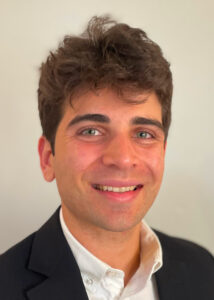
Butler conducts research in labor economics on the impacts of public policy and the role of market concentration. His research also involves economic history, the economics of crime, and industrial organization.
“Economics at its core is really a study of how humans make decisions and interact with each other,” Butler said. “Engaging with students who are intellectually curious about the world around them creates the richest setting for exploring how and why things occur.” As Trinity students explore different career paths, Butler said, they think deeply about factors close to labor economics, including the value of work and skill accumulation.
Butler has worked as a replication analyst at the Institute for Replication and as a research assistant at CU Boulder. Butler said that he hopes to motivate future problem-solvers at Trinity, regardless of their interests.
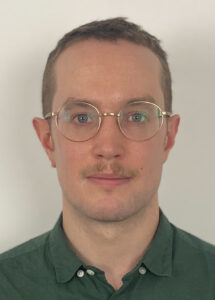
A scholar in the field of religion and literature specializing in Judaism, Catlin’s research interests include modern Jewish thought and literature, U.S. Jewish literature and culture, biblical and rabbinic literature, the history of hermeneutics, secularism, and critical university studies. He is currently completing his first book.
His courses at Trinity will be collaborative and discussion-based, encouraging curiosity and experimentation. Catlin said, “In my experience as a liberal arts student and now as a professor, I’ve found it’s when students have the chance to take interpretive risks, share their ideas, and work through their questions in dialogue with each other that they achieve the deepest understanding of a text and why it matters.”
Catlin has taught previously at the University at Buffalo, SUNY and at the University of Chicago, where he earned a joint doctorate in comparative literature and religious studies.
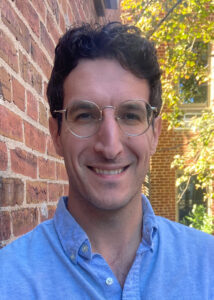
Cooper’s research interests include moral and political philosophy, and his teaching covers ethical theory, applied ethics, social and political philosophy, as well as the history of moral and political philosophy.
“I’m most looking forward to working with students in small, seminar-style courses,” Cooper said about coming to Trinity. “That is how I encountered philosophy as an undergraduate, and I loved the in-class discussions as well as the attention and collaboration I found with my professors.”
Cooper added that he believes students today are increasingly navigating difficult questions about how to live well. “These questions try to reconcile their desire to flourish in the context of a market society, where what we can do and be is increasingly subject to what we can produce for employers and the things we can buy and sell through markets,” he said.
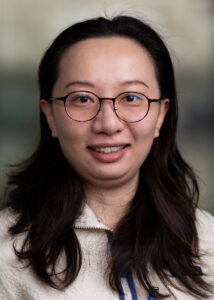
Gao is an electrical engineering researcher focused on electromagnetic theory, photonic crystals, and antenna design—with wide-ranging applications in wireless communication, medical imaging, and beyond. Her research bridges theoretical modeling with field experiments, notably contributing to NASA’s SMAP mission for soil moisture monitoring.
Gao said. “As an engineer, I find it deeply rewarding to be in a place where technical disciplines are taught alongside the humanities and social sciences, fostering well-rounded and socially engaged thinkers. Today’s students are increasingly interested in how engineering can drive innovation and address real societal needs. I think this intersection of theory, technology, and impact is what makes engineering so exciting and relevant to the next generation.”
Connecting foundational concepts with practical engineering challenges, Gao’s teaching approach is informed by her industry experience at UL Solutions improving mobile antenna safety standards. She co-developed a patented UHF RFID tag design for biomedical environments.
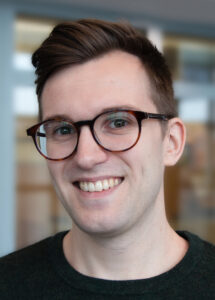
Gemmel, whose research interests lie at the intersection of synthetic chemistry and biology, said he is excited to work with Trinity students as they discover their passions. “I hope to instill them with an appreciation for scientific inquiry,” he said. “It is a privilege to work with talented students who are highly engaged in their education and the world around them.”
His lab at Trinity focuses on using enzymes as catalysts to expand the synthetic chemist’s toolbox. “In my laboratory, we study enzymes—nature’s molecular machines—which have acquired highly specialized functions over millions of years of evolution,” Gemmel said. “Specifically, we want to use these enzymes as sustainable catalysts to synthesize small biologically active molecules.”Gemmel grew up in a small village in Germany. His post-doctoral fellowship at the University of Michigan was in the field of organic synthesis and biocatalysis.
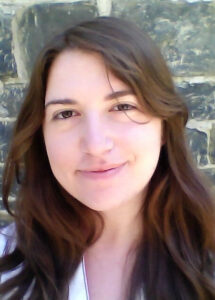
Goldstein began teaching at Trinity in 2022 as a visiting assistant professor of urban studies. Her research investigates histories of urban planning in India and North America. With several years of experience at Trinity, Goldstein aims to deepen the connection between her teaching, her research, and the city of Hartford, she said, “whether that means building partnerships in the city or designing assignments that push students to think beyond the classroom.”
Prior to earning her doctorate, Goldstein worked for the India China Institute and as a consultant for the United Nations Department of Economic and Social Affairs and UNICEF. As a teacher, she promotes student-led inquiry and interdisciplinary perspectives.
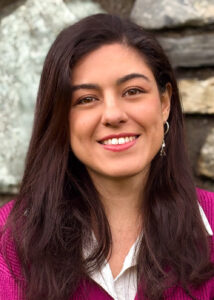
Jiménez began her academic career as a researcher and lecturer at the Berlin School of Economics and Law in 2020. Her research interests include macroeconomics, international economics, ecological economics, development economics, and political economy.
“I believe my research and teaching area will resonate with Trinity students because it engages with some of the most urgent and deeply felt concerns of current times,” Jiménez said. Jiménez said that her teaching philosophy emphasizes reflection, creative inquiry, and critical thinking. She strives to build student curiosity and engagement, encourages open dialogue, and presents pluralist perspectives within the field of economics.
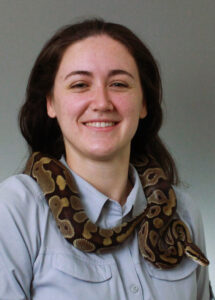
Building on a lifelong love of reptiles and amphibians, Keeffe’s research areas include evolutionary biology, zoology, functional morphology, biomechanics, and herpetology. Keeffe has developed a teaching style focused on collaborative learning and using art to understand scientific concepts.
Keeffe’s lab uses modern techniques such as micro-CT scanning, 3D modelling software, and high-speed X-ray videos to answer questions about patterns of evolution in vertebrate animals. “Understanding and conserving the natural world often resonates with students—biology majors or otherwise—and they often find the technical skills I teach valuable because they can be applied broadly across disciplines, including medicine, art, and engineering,” she said. “I am also lucky enough to study particularly charismatic organisms, such as frogs and snakes, which fascinate many students .”
Before coming to Trinity, Keeffe was a postdoctoral research fellow at Mount Holyoke College.
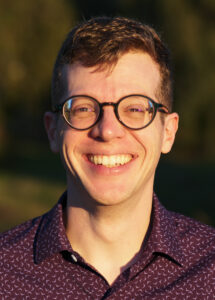
Thompson-Brusstar’s research and teaching interests are the politics of bureaucracy, authoritarianism, and development, especially in China and martial-law Taiwan.
“As a graduate of a liberal arts college, I am looking forward to providing the same type of deep teaching and mentorship that I was lucky to benefit from as an undergraduate,” Thompson-Brusstar said. His classes focus on developing the skills and background necessary for the analysis of politics, both contemporary and historical. In the classroom, he emphasizes interdisciplinary connections, active learning, and student participation in research.
Thompson-Brusstar previously served as a postdoctoral scholar at the 21st Century China Center of the University of California San Diego School of Global Policy and Strategy.